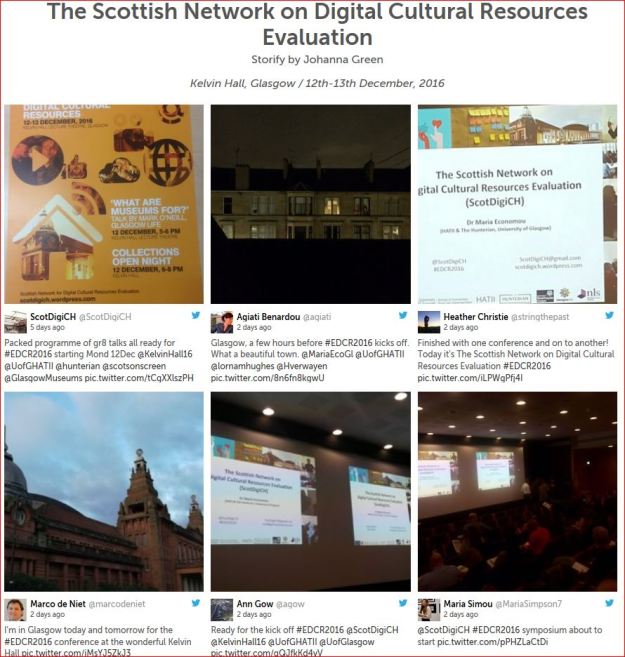The increasing use of digital technologies in the cultural heritage (CH) sector is undoubtedly a more than ever topical issue. This makes its evaluation necessary, which is what the Symposium addressed. All the speakers, renowned in their field, talked from a different perspective and focused on the impact that derives from the use of digital technologies in the CH sector, the importance of evaluating this, and the latest developments on how to evaluate the use of digital cultural resources.
The talks covered a broad spectrum of digital heritage and digital humanities topics: the evaluation of digital collections and their users; the use of heritage visualisation and VR; digital technologies and narratives in museum exhibitions; also the creation, use and evaluation of digital cultural data. Moreover, a broader perspective was given by funders (such as the HLF), institutions (like the V&A Museum) and organisations (such as the Europeana Foundation). This interdisciplinarity offered a unique combination of perspectives and provided a comprehensive picture of developments in the respective complementary fields.
A common theme that cut across different talks was the different evaluation methods, both qualitative and quantitative, used in different case studies. Seeing the different evaluation approaches and the results of each project, it was possible to form a better and deeper understanding of the importance and the necessity of the whole evaluation process. A crucial observation coming out of EDCR2016 was the need for long-term evaluation. In other words, that evaluation should not only cover the impact of the visitors’ or users’ experience in the short-term, but also to try to record what will the impact be in 5, 10, or 20 years from now.
Among the issues that were discussed was also the use and significance of high-quality and well-structured metadata. In the case of an advanced research at an online platform, metadata that are not well structured cannot give very accurate results, so they need improvement and development. It was argued Dr Ina-Maria Jansson (Department of ALM, Uppsala University) that what is needed is new metadata and not the old ones.
Other topics that were discussed were public engagement and how can this be best supported and enhanced by digital technologies. One of the Symposium sessions was devoted to virtual heritage and 3D reconstruction models which aim to boost both public engagement and virtual tourism. Laia Pujol-Tost (Pompeu Fabra University, Barcelona) talked about the {LEAP] (Learning of Archaeology through Presence) project and the idea of cultural presence. The project developed a new understanding of presence aiming to enhance the 3D model and VR experience using the case study of the UNESCO World Heritage Neolithic settlement of Çatalhöyük in Turkey and the natural surrounding environment. The evaluation showed that people do not seek so much photorealism but social interaction in the 3D reconstruction models and games.
Moreover, complementing the first day of the Symposium, delegates together with local community groups and members of the public had the unique opportunity to attend an inspiring public talk by Dr Mark O’Neil (Head of Policy and Research at Glasgow Life, the culture and sports umbrella organisation of the City of Glasgow), on “What are Museums For?”.
As part of the Symposium, we also had the opportunity to also participate in the Workshop “Using the Europeana Impact Framework to conceive Performance Indicators”. The Workshop was engaging, well organized and innovative. It was very stimulating as we had to work in groups exploring in practice different ways of recording and analysing impact. In my group, for example, we had to act as staff members of the fictional Scottish Historic Photography Museum and take decisions adopting different lenses (our group had the Learning lense, for example), in order to create an impact pathway with activities-output-outcomes, and KPIs.
As digital technologies hold a prominent place in the CH sector, their evaluation has a crucial role to play. The dialogue for the appropriate evaluation of digital cultural resources which the Symposium brought to the fore continues to develop. It is worth noting one of the lessons learned by the ENUMERATE EU project that was presented by Marco De Niet (DEN, Digital Heritage Netherlands Foundation): only 10% of European cultural heritage collections have been digitized to date. Hence, a lot of work remains to be done in this direction, both for the digitization of cultural heritage collections, but also for the better use of the material already digitized and for making the evaluation process more effective.
Two great days-full of food for thought! Thank you ScotDigiCH so much for organising EDCR and for the bursaries supporting early career researchers and post-graduate students which enabled us to attend! We look forward to the publication of the papers from the Symposium and future events.
Angeliki Tzouganatou
postgraduate student, MSc in Digital Heritage at the University of York
(recipient of one of the EDCR bursaries)



